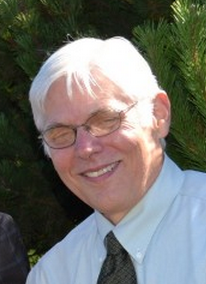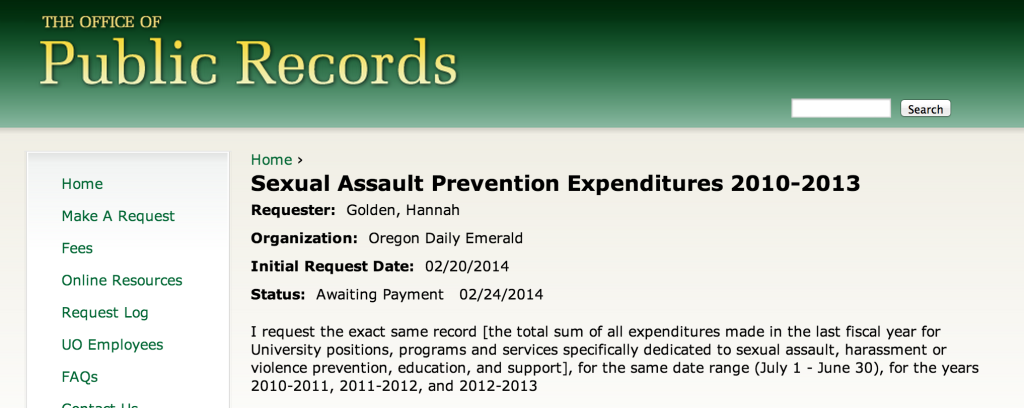Under Dave Hubin UO’s Public Records Office refused to give fee waivers to journalists – even UO student journalists. Oregon public records law requires an explanation for fee waiver denials. Hubin and PR Officer Lisa Thornton ignored that law. Now Daily Emerald reporter Noah McGraw has written a very good report…
Posts tagged as “Dave Hubin”
In their editorial on Governor Kate Brown’s inaugural address, here: … Brown also promised to make Oregon’s public records more easily and quickly available to the news media and to the public. That’s an appropriate reaction to the Kitzhaber administration’s stonewalling on public records requests for documents pertaining to the…
They’ve been hoping that opinions issued by Lane County DA Alex Gardner and Associate DA Patty Perlow would allow them to redact UO documents en masse, instead of having to explain what they were hiding. But the Oregon Court of Appeals has just rejected that Gardner and Perlow interpretation of…
Dave Hubin writes a glowing report on Dave Hubin’s Public Records Office, for UO’s official “Around the 0” blog: “The UO is open with its information, much of which is available in many places, and our hope is to consolidate some of the existing information and make it more accessible for public records requesters,”…
9/18/2014 update: Excluding duplicates, UO has received roughly 40 public records requests in the 90 days since June 18. Log here. That’s roughly two requests every three working days. They’ve got two staff, plus help from the GC’s office on redactions. Some requests are complicated, but many are simply asking…
7/23/2014: I thought I’d repost this classic on the meetings of Dave Hubin’s working group to hide public records. From what I can tell this group has now accomplished its mission and is defunct.
6/5/2013 meeting, page down for 3/7/2013 meeting.
Prologue:
- Last meeting (see below) was a disaster for Hubin and Thornton, who got raked over the coals and revealed that there were serious problems with the office’s decisions about fee-waivers, bad software, refusal or complete inability to answer questions about policies, inconsistent statements, no decision on the STC recommendation for fee-waivers for student journalists.
Synopsis:
- Dave didn’t even tell UO’s student-journalists that the meeting was being held, they found out about it from UO Matters.
- Faculty and students not allowed to ask questions.
- Thornton killed a bunch of committee time with irrelevant numbers, worked well.
- No progress on public-interest fee waiver policies. Still a black hole. Thornton’s statements just added to the mystery of what current policy is. Still seems like she has *never* given a full fee-waiver.
- In Feb the STC voted unanimously to recommend Gottfredson waive fees for student-journalists, up to some reasonable limit, with Hubin to determine what’s reasonable. Gottfredson won’t do it, claims he’s studying the issue. He was provost at UC-I, where there are no fees for anyone (except for computer programming time, if that’s required.) So Gottfredson already knows how well this would work, and he just doesn’t want the students to be able to get information on how UO is spending their money.
Live-blog disclaimer: My opinions on what people said or would have said, if they only had a spine.
6/20/2014 update: Gottfredson’s efforts to cover up his handling of the rape allegations bring more trouble to UO. The full Oregonian and RG petition, which is considerably more comprehensive than the NYT’s, is here: UO has pled for more time to respond, and the Times et al. have given them…
6/10/2014 update: Transparency is lacking at the UO (Letter to the RG)
In his June 4 letter, David Hubin, the supervisor of the University of Oregon’s Public Records Office, chastised The Register-Guard for omitting information from its May 31 editorial about the pages and pages of colorful redactions his office made to documents concerning the UO’s response to March 8-9 sexual assault allegations.

Hubin said he was “disappointed” the editorial “didn’t provide all the facts about why the university can’t release certain information. The newspaper’s readers deserve to understand the university isn’t hiding the information but is following laws that protect student privacy.”
But, as was explained in the May 30 news report by Josephine Woolington, the UO redacted many of the pages to protect administrators, not students. Those redactions included “frank discussions” between UO officials and emails covered by “attorney-client privilege.” The pages were helpfully color-coded in marigold and blue by Hubin’s office.
The redacted communications are presumably between President Michael Gottfredson, his administrators and “his” attorneys in the UO’s general counsel’s office. Actually, those attorneys are supposed to represent all the university, not just the president. In any case, Gottfredson could waive that privilege and disclose those “frank discussions.” He didn’t.
Such secrecy is part of a pattern. In February, the university even tried to charge our student journalists for budget information on expenditures for sexual assault prevention.
I believe it’s too late for Gottfredson’s administration, but our next president will need to improve transparency and build some trust in the UO community.
BILL HARBAUGH
PROFESSOR OF ECONOMICS
FORMER CHAIRMAN, UO SENATE TRANSPARENCY COMMITTEE
6/5/2014 update: UO releases 323 more pages of redacted docs on rape allegation cover-up
PDF of today’s release here. A zip file of all the records I’ve obtained so far is here. The public records office’s response included a disclaimer that this is just a partial release. I’ll update when they decide to release more. The office’s log file is here.
UO has gone with more blue and marigold this time – the colors for redacting documents because they contain “attorney client privilege” or “frank discussion”. Green means Hubin’s office is claiming the redactions are needed for student privacy.
I’ve haven’t looked through this much, but there is some frank discussion between Intercollegiate Athletics Committee Rob Illig (Law school prof) and the IAC members about President Gottfredson’s April 29 decision to dismantle the committee for asking too many tough questions. The day after he saw the EPD report, and was still hoping he could cover it up. The faculty emails are unredacted, but the ones between UO’s administrators are in marigold. An interesting double standard!. The cover-up timeline is here.
6/4/2014 update: Dave Hubin takes the dive for Gottfredson’s redactions. Shame on you, Dave.
This is worse than when Hubin tried to charge the student newspaper to see the budget numbers on how much UO was spending to address sexual assault prevention:

His letter to the RG editors, in response to their “Redaction Run Amok” editorial is here. All about protecting student privacy:
As the person who supervises the University of Oregon’s Office of Public Records, I was disappointed that a May 31 editorial didn’t provide all the facts about why the UO can’t release certain information. The newspaper’s readers deserve to understand the university isn’t hiding the information but is following laws that protect student privacy.
Sure it is. Hubin does not mention the many redactions made because they include “frank discussions” between UO officials, or “attorney-client privilege”. These are helpfully color-coded in marigold and blue, respectively, as explained by Josephine Woolington in her May 30 RG story here.
The redacted emails are presumably between Mike Gottfredson and “his” attorneys in UO’s General Counsel’s office. Actually those attorneys are supposed to represent UO, not Mike Gottfredson. And in any case Gottfredson can waive that privilege if he wants, and disclose his “frank discussions”. So what are Hubin and Gottfredson hiding?
5/31/2014 update: Register-Guard editorial board on Gottfredson’s “Redaction run Amok”
11/26/2013 repost.3/25/2013: UO’s academic accreditation comes through the NWCCU, which in turn is supervised by the US DOE. UO filed it’s latest report on 3/1/2013, compiled by Dave Hubin. Full of bold talk and more than a few half-truths. Read it all here. The cover page refers to our goal…
9/22/2013: Thanks to UO Professor Kyu Ho Youm’s excellent twitter feed for the link: Full pdf here. Of course a law doesn’t create transparency and trust if those in power have things to hide, and can find willing stooges to help them do so.
8/14/2013 update: Oregon’s public record situation is also worse than Lousiana’s: A Louisiana university was found in contempt of court Wednesday for its failure to produce records related to its recent presidential search. The order of contempt — and $500 per day fine that accompanied it — is the latest in a…
8/14/2013 update: Finally got one page from Geller’s office on HLGR billing issues, in which Rudnick’s firm promises to be more vigilant in the future. 6/23/2013. Surely someone in Randy Geller’s GC office has responsibility for looking over the billable hours, checking productivity, asking questions about the inevitable little mistakes…
7/27/2013: Plus another $56,000 to the San Fran anti-union firm, Curiale, Hirschfeld and Kraemer. Or that’s the rumor tonight around the faculty club BBQ pit. I don’t believe all the HLGR money is for bargaining, part of it must be for some lawsuit Geller isn’t competent to deal with in-house.…
7/26/2013: “Around the O” releases details on Gottfredson’s official calendar. Just kidding, it’s a puff piece about his trip to Fort Rock: Participants in this year’s tour included UO President Michael Gottfredson and his wife, Karol; Interim Provost Scott Coltrane and his wife, Wendy; Eugene Mayor Kitty Piercy and her…



Fees for reporters, subsidies for propaganda
7/15/2013: We’ve written before about the $104K cost of “Around the O”. Here are two much worse examples of how UO is making work more difficult for real reporters, while spending public money on what amounts to propaganda. I suppose you could argue this is good for UO in the…